_12 Days Agri-Tour - Best of Main Land
China
Day 1, - Beijing
Arrival into Beijing in the evening. Transfer from Airport
to Hotel. Dinner.
Day 2, - Beijing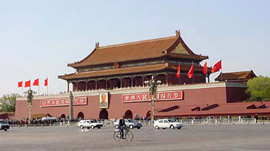
As an introduction to the imperial city of Beijing the tour
offers a stroll in Tiananmen Square, the world's largest square,
bordered by the Great Hall of the People, Mao's Mausoleum
and the National Museum of China. This will be followed with
a walk to the Forbidden City, the complex of imperial palace,
which was home to the Chinese Emperors for over 500 years.
Sited on 72 hectares of land with 9000 rooms covering a floor
space of 150,000 square meters. Grand halls and courts gradually
give way to more intimate domestic quarters, giving an insight
into the pampered isolation of the emperors. This afternoon
will be one of the highlights of China tour, the climbing
of the Great Wall. No visit to China would be complete without
seeing the Great Wall. The Great Wall of China was first built
in the Warring States period (475-221 BC) as a series of earthworks
erected by individual kingdoms as a defense against each other
as well as from invasions from the north. Its main objective
was to keep out Genghis Khan and the Mongolian hordes. This
proved only partially successful. The present day wall was
left from the Ming dynasty and it represents one of the wonders
of the world. After this excursion, Peking Duck Banquet. Overnight
Beijing Jianguo Hotel****
Day 3, - Beijing
Today we drive to suburban district of Beijing, between 50-100km
around Beijing to see a large dairy farm, a modern vegetable
growing farm, orchid, piggry, arable land. In each farm we
arrange a short time meeting with local experts and agricultural
officials for discussion on interesting subjects of both sides.
This afternoon, before we leave, we will visit one or two
smaller private farms and families. Overnight Beijing Jianguo
Hotel****
Day 4, - Beijing / Xining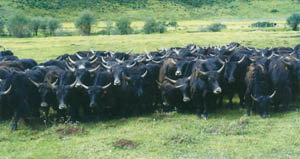
In the morning, we fly to the west for 2 hours to Xining,
the capital city of Qinghai Province. The city is situated
on the edge of the Tibetan Plateau at 2200m. Today it is a
quite modern city and there is little left of the old walled
town that used to be the main trading station between China
and Tibet and entrance to the Silk Road. The population today
is Chinese, Mongol, Tibetan, Muslim and Tu, a good small western
city to view the new development in resent years, especially
after the Chinese Government carried on the policy of "Western
Region Development of China" 5 years ago. In early 2005,
the Chinese Ce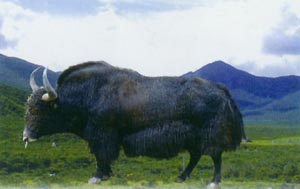 ntral
Government has decided to allocate 750,000,000 Yuan (US$92.6million)
specially for improving the environment of this province as
the three important rivers: the Yangtze, Yellow and Mekong
originate from here. After lunch, we drive 30km to visit Kumbum
Monastery, which has been well known for many centuries all
over Tibet. The third Dalai Lama founded this Holy Monastery
in 1560 to commemorate the birthplace of Tsongkhapa, the founder
of the Yellow Sect. It is one of the six important Gelukpa
(the Yellow Sect) monasteries in whole Tibet and a center
of Tibetan learning in Eastern Tibet. We can find many Tibetan
nomads who come here for pilgrimage and to buy textiles for
their clothing and jewellery along numerous Tibetan shops.
Overnight Qinghai Hotel**** ntral
Government has decided to allocate 750,000,000 Yuan (US$92.6million)
specially for improving the environment of this province as
the three important rivers: the Yangtze, Yellow and Mekong
originate from here. After lunch, we drive 30km to visit Kumbum
Monastery, which has been well known for many centuries all
over Tibet. The third Dalai Lama founded this Holy Monastery
in 1560 to commemorate the birthplace of Tsongkhapa, the founder
of the Yellow Sect. It is one of the six important Gelukpa
(the Yellow Sect) monasteries in whole Tibet and a center
of Tibetan learning in Eastern Tibet. We can find many Tibetan
nomads who come here for pilgrimage and to buy textiles for
their clothing and jewellery along numerous Tibetan shops.
Overnight Qinghai Hotel****
Day 5, - Xining
 After
breakfast, we drive for two hours to visit Wild Yak Crossbreeding
Farm in rural County. It is the first and biggest center of
wild yak kept for covering in China, was established in 1952
and since 2001, with support from the provincial government,
it became the biggest center for providing freeze-dried semen
from the 12 fine species of wild yaks in this farm, producing
10,000 tubes a year for the market. The farm has 54195ha natural
grassland and 245ha of forage grass farmland, breeding 85
groups of female yaks with total number more than 10,000 in
which 12 groups are using artificial insemination. Every year
the farm produces 1000 first class male breeding yaks and
2200 female breeding yaks for farmers and nomadic people.
After the crossbreeding, the new generation of per yak increases
the weight 30% - 55%; milk production 11-28%; butterfat 16.8%
and yak wool 25%. Then we visit a Deer Farm nearby, it has
sika deer, red deer and white-lipped deer with total number
466. After visits, we have a technical meeting with local
officials and experts from the two farms to exchange views.
Overnight Qinghai Hotel**** After
breakfast, we drive for two hours to visit Wild Yak Crossbreeding
Farm in rural County. It is the first and biggest center of
wild yak kept for covering in China, was established in 1952
and since 2001, with support from the provincial government,
it became the biggest center for providing freeze-dried semen
from the 12 fine species of wild yaks in this farm, producing
10,000 tubes a year for the market. The farm has 54195ha natural
grassland and 245ha of forage grass farmland, breeding 85
groups of female yaks with total number more than 10,000 in
which 12 groups are using artificial insemination. Every year
the farm produces 1000 first class male breeding yaks and
2200 female breeding yaks for farmers and nomadic people.
After the crossbreeding, the new generation of per yak increases
the weight 30% - 55%; milk production 11-28%; butterfat 16.8%
and yak wool 25%. Then we visit a Deer Farm nearby, it has
sika deer, red deer and white-lipped deer with total number
466. After visits, we have a technical meeting with local
officials and experts from the two farms to exchange views.
Overnight Qinghai Hotel****
Day 6, - Xining / Xian
In the morning, we fly to Xian, the capital city of Shaanxi
province, is one of the oldest settled regions of China, with
remains of human habitation dating back to prehistoric times.
It is from here that caravans started on the Silk Road to
Europe, changing the Western world forever. As the Wei River,
a branch of the Yellow River, cuts across the middle of the
province, this fertile land became a center of Chinese civilization.
The earliest evidence of human habitation dates back 6000
years to Neolithic times, when the plain was lush and green
and primitive Chinese tribes established their villages. This
morning we visit some important historical sights including
the Ban-Po Primitive Society Museum, one of the earliest places
where people cultivated farmland 6000 year ago and fossilized
millet and vegetable seeds are displayed in many original
pottery jars then later explore the agriculture products markets.
Be preparing for some surprises: This afternoon one of the
highlights of the tour is a visit to the buried army of Emperor
Qin Shi Huang. This 2180-year-old terracotta army of more
than 800 soldiers was discovered in 1974. On the way, we visit
a peasant village where we talk to some farming families about
their enterprises, growing grain crops, kiwifruit and pomegranate
orchard and visit their homes. See Tang Dynasty show with
dinner in the evening. Overnight in Xian
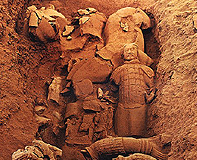 Day
7, - Xian Day
7, - Xian
We drive about two hours to suburban County to see corn, potato
farm, dairy farm, cotton, piggeries, orchard farms and irrigation
schemes. Technical meeting with local agricultural experts,
officials, marketing people and farmers will be arranged after
each visit and peasants' villages. Overnight Xian.
Day 8, - Xian / Guangzhou
In the morning, we fly to Guangzhou, the capital city of Guangdong
Province and one of the main north gateways to the country
for centuries. It is known as one of the biggest province
to supply the tropical agriculture products both to main land
China and export to other foreign countries. We take one-day
tour to visit one or two big vegetable farm, Then we see a
big agricultural products' market and a city tour. Overnight
Guangzhou
Day 9, - Guangzhou / Hangzhou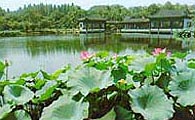
In the morning, we fly to Hangzhou, a city when Mr. Marco
Polo passed through here in the 13th century, he described
it as one of the finest and most splendid cities in the world.
We visit An agricultural high-tech demonstration park which
was officially set up for introducing advanced international
agriculture technologies as well as inform farmers about related
technologies and also welcomes international visitors to come
to the park to seek business opportunities. We will have a
technical meeting with scholars from the park. Then a sightseeing
around the famous West Lake, no wander all most all Chinese
said " Above there is heaven, below there is Suzhou and
Hangzhou". In the afternoon, we visit a big Tea Farm.
Overnight Sunny Hotel****
Day 10, - Hangzhou / Suzhou
After breakfast, we drive 2.5 hours to Suzhou. Considered
to be the "Venice of the East" and one of the oldest
cities, Suzhou is an attractive city with an extensive network
of canals and is well known for its beautiful gardens. After
arrival, we drive for 45 minutes to visit a small dairy operation
in the center of a modern Agricultural Technology Park (Agriworld).
This is a research center involved in evaluating various breeds
of cows and species of animals like ostrich, peacock, wild
duck and chicken and plants and crops recommending to Chinese
peasants. After the visit, meet with local agriculture experts.
Then visit the Serging Waves Garden, the oldest existing garden
in the city and one of the four most famous classical gardens
in China built in Song Dynasty 900 years ago. Overnight Aster
Hotel****
Day 11, - Suzhou / Shanghai 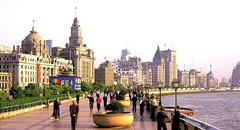
In the morning, we take boat cruising on canal to view people's
daily life for one and half-hours. A visit of the Suzhou Silk
Institute and learn the ancient art of making Chinese silk
products by hand. Also, we will enjoy a silk fashion show
and do some shopping. After lunch, we drive for two hours
to Shanghai, a city with 16 million people and an important
center for trade and industry in China. Check in our hotel,
then sightseeing including Nanjing Road, one of the busiest
and biggest shopping street in China will be arranged. Stroll
on the Bund, Shanghai's famous waterfront. Overnight Ocean
Hotel****
Day 12, - Shanghai
We will visit the Yu Garden, which is characteristic of the
architectural style of the Ming dynasty. It is a private garden
in the southeast of Shanghai, with a history of 400 years.
The garden features more than 30 halls and pavilions. Outside
the Yu Garden there is very interesting market with every
thing that you can think of for sale at low price. We visit
Shanghai Sun Qiao Modern Agri Development Zoon, where there
are a lot to see, many kinds of organic vegetables, grains,
edible fungus, fine seedlings, experimental fields, some pickled
vegetables processing, technical center of bio and microbe,
cell and gene engineering and talk with agri scientists. We
visit a silk carpet factory. Overnight Ocean Hotel****
Day 13, - Shanghai / Back Home
|





